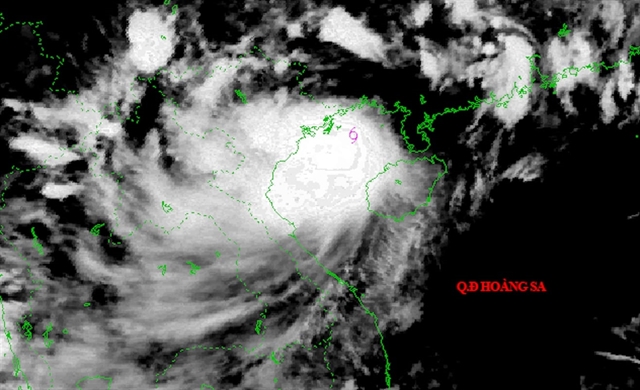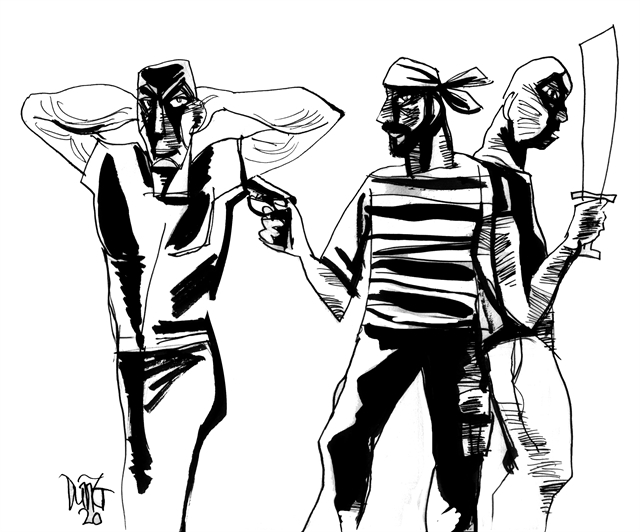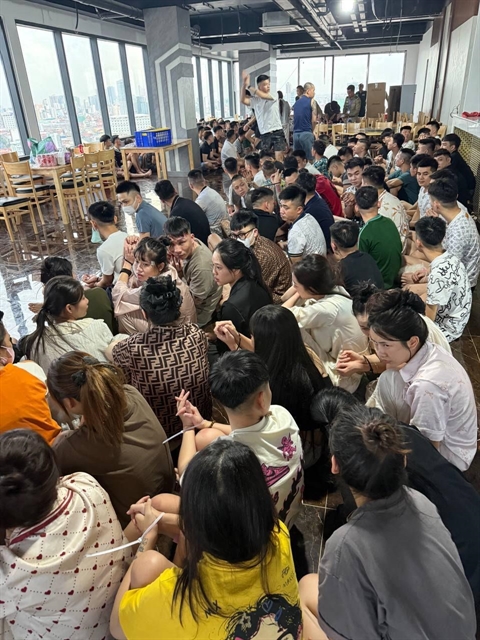

A short story by Trương Anh Quốc

|
| Illustration by Đỗ Dũng |
By Trương Anh Quốc
The sailors had been busy since the afternoon, lighting up the ship and readying the fire hose along the deck. Though the sun was yet to set, all lights were on. The fire hose sprayed water into the inky darkness throughout the night. Everybody braced for pirates.
Whenever the ship crossed the Strait of Malacca, all on board took turns watching out for pirates. This stretch of sea bordered Singapore, Malaysia and Indonesia. It was the shortest and thus busiest route between the Pacific and Indian Oceans. The route was lined with dense tropical jungles in Malaysian and Indonesian territory, as well as islands large and small emerging from the quiet, deep water. As the ship crossed the strait, it was flooded with messages from the ship’s owner, the ship’s lessee, and the cargo owner, as well as warnings from local authorities about pirates in the vicinity. Local authorities simply couldn’t maintain a solid grip on the security of the seas, so pirates pretty much had a free reign. For a cargo ship without weapons, prevention was better than cure.
Since the afternoon, all doors leading to the deck were locked from the inside. The bridge and the engine room were welded shut with three locks. Pirates often wrenched control of a ship’s engine room and bridge. No one was allowed to open any door but the side door of the bridge to get to the deck. At night, nobody was allowed to get out, except sailors on duty.
Every shift had three sailors: two guarding the deck and one mechanic. One deck guard stood near the funnel behind the bridge. The funnel interfered with the ship’s radar, so pirates often attacked from that direction. The second guard protected the right flank, and the mechanic the left.
Every sailor on duty was armed with a flashlight and an iron bar. Before the ship reached the Strait of Malacca, the foreman had made sure each sailor had an iron bar. Those who preferred to use nunchuks could do so. Most seamen already had at least one dependable way to defend themselves.
Two search and rescue headlights on the roof of the bridge were put to good use, scouting for any small ships closing in. Ships crossed the Strait of Malacca at all hours of the day and night and were now allowed to turn on more lights than usual. At night the strait was brilliantly lit with red and green lights, like a lantern festival during a full moon.
Shifts lasted for four hours, starting from 5pm until dawn. During the first few hours of evening, hot equatorial winds carrying salty water vapor buffeted the ship. Sailors on duty had to bring drinking water with them to ward off the thirst, because once in place they couldn’t leave their post. Near dawn, conversely, the winds became chilly and the air filled with mist.
Pirates are sneaky, of course, so don’t give away their position with navigation or signal lights. Seamen on duty aboard ships must keep their eyes and ears open and strain to locate any strange vessel approaching. They didn’t stay rooted in one place, instead walking to and fro looking for anything suspicious. If something didn’t look right, they would immediately alert the officer on duty inside the bridge, who had binoculars and the skill to determine if a threat was near. Sometimes, to the sailors’ dismay, tiny fishing boats or even tugboats with barges strayed near the ship, despite repeated blasts of the horn.
To ensure safety for all, sailors on duty must follow a stringent set of rules. The captain could drop by at any time to check. Anyone missing from their post would be disciplined. A guard must wait for 15 minutes after being replaced before leaving his position. He must not leave his post to seek his replacement. His replacement must not reach the deck via any other route than the bridge’s side door. A guard returning from his shift must also use this route, to prevent pirates gaining access to cabins should they board.
The ship managed to cross the Strait of Malacca safely. But because it’s next turn was east, parallel with Indonesia, the sailors had to remain on guard for a few more days and nights. This area of sea was quiet. Only once in a while did a ship pass by, making “pirate watch” a lonely experience. When Đẳng went to change shifts, Hùng teased him: “Your post is behind the funnel.” “Everywhere is the same,” Đẳng replied.
Đẳng’s junior status made him the target of Hùng’s teasing. Ordinary Seaman, or OS, were assigned to guard the flanks. Able Seaman, or AB, stayed in the funnel area to guard the rear. When pirates weren’t an issue, AB would be assigned lighter duties in the bridge. Đẳng was an OS. He should have been promoted to AB. Just a week earlier, another AB fell ill and had to return to Việt Nam. While waiting for a replacement, one of the two OS on board, Đẳng or Hội, was to be promoted.
To make that decision, the deck officer, the engineering officer, and the chief mate held a meeting. Based on seniority, the choice should have been Đẳng, but the three proposed the captain promote Hội. The chief mate disliked Đẳng. He was straightforward and often talked back when he saw something amiss, despite finishing his tasks quickly and taking breaks only when allowed. But the chief mate was often displeased with him.
Đẳng graduated from college while Hội only completed technical high school. Though college degrees weren’t essential, seamen were required to have some type of qualification. Their salaries and bonuses were based on the titles they earned, however, not their academic background. Đẳng had more knowledge, but Hội was shrewd.
In the time leading up to the captain making a decision, Hội worked much harder and behaved more politely than usual. After work, he went to the officers’ cabins to chat. He frequented the bridge to learn more about navigation and perhaps even to approach the captain. Being a foreigner, the captain appreciated people talking to him. When the ship berthed in India, Hội went to buy wine and gave each officer one bottle as a gift and the captain two.
The captain couldn’t tell good wine from bad, but he appreciated the gesture. One day, the third engineer took a sip of Hội’s wine and promptly fell ill for several days. The wine Hội had bought turned out to be some cheap cassava brew with an exotic label that made it appear expensive. Some of his shipmates joked that the wine was only good for roasting cuttlefish or treating scabies. Everyone he had given a bottle to realised he had simply tried to buy their favour, and consequently threw the bottles into the sea.
Đẳng was totally different: straightforward and honest. But honesty wasn’t always the best policy, especially on board when a promotion was in the offing. Promotion meant more money, titles, trust, and, hence, employment.
He didn’t resent Hùng’s teasing in the slightest. He hardly resented anybody for anything. He said whatever he felt straight to someone’s face, and then moved on.
As they stood guard on the two sides of the ship, Hùng and Đẳng would sometimes need to contact each other on their walkie-talkies. Only important information was passed on; it wasn’t a time for chatting. Inside the bridge, the captain would call them to attention if he caught them talking at leisure. The captain often wondered aloud why Vietnamese people talked so much. He made an opening and closing gesture with his thumb and fingers to illustrate their incessant talking. When a sailor on duty used his walkie-talkie, the captain would assume that something was going on. A strange vessel may be approaching.
The ship had passed the “danger zone” marked on the map. The two sailors guarding the flanks began to turn off the lights and remove the fire hose. Hội left his post behind the funnel and went back to the bridge a little earlier than scheduled.
It was the wee hours. A high-speed boat full of pirates suddenly rushed towards the ship’s stern. In a flash, two pirates threw hooks over the railings and climbed aboard. Hội walked out, saw the pirates, and stood dumbstruck, shaking. The bald pirate darted forward to overpower him. The long-haired one pointed a gun at his chest. Hội did as he was told and stood still and let the bald one, who had a machete, tie his hands behind his back.
The pirates then pushed him back inside the bridge and kicked the door wide open. The bridge wasn’t locked from the inside in the mornings. The chief officer, who was on duty, pressed the emergency alarm as soon as he realised what was happening. The long-haired pirate directed his gun at the chief officer and pulled the trigger. He missed, with the bullet flying over the chief officer’s shoulder and smashing into a glass screen, which shattered into a million pieces on the deck.
A seasoned seaman, the chief officer raised his hands above his head to surrender. The long-haired pirate jumped forward and tied him up. In this very situation, the rule was to stay where you were and protect your own life and then the ship.
The pirates knew the chief officer wasn’t the captain, because captains didn’t take the helm at this time of night. The captain was, indeed, sleeping. The bald pirate brandished his shiny machete, glowered, and shouted at the chief officer:
- Captain?
The chief officer pointed downwards. The pirates left him alone and kicked Hội in the back to prod him along. Hội looked at the chief officer to seek guidance, and then, his whole body shaking, led the pirates down to the captain’s cabin. The door wasn’t closed. The pirates burst inside, and Hội sneaked away.
The cabin consisted of a living room and a bedroom. The bedroom was locked from the inside. The bald pirate banged loudly on the door with his machete. The captain awoke with a start, then began cursing. He went to open the door and dress down whoever was causing the ruckus. No sooner had he opened the door, however, than the bald pirate kicked it back in his face. The captain faltered. The long-haired pirate leapt forward and pointed his gun at the captain’s head. The captain slowly raised his hands above his head and said:
- Don’t shoot!
The long-haired one shrieked:
- Money!
The captain looked stunned. The long-haired one pointed his gun upwards and fired. The bullet put a hole in the ceiling, the shell bouncing on the floor.
Bewildered, the captain opened his wardrobe and took out a key. He used the key to open the top drawer, from which he pulled out another key. This second key was then used to open the lower drawer underneath. It was only in the third drawer did the captain take out the key to the safe.
The captain kept a lot of money inside, to pay salaries, buy food supplies, and cover any extra expenses incurred while crossing international waters. He pulled out a big bundle of low-value bills, having put the high-value bills elsewhere. He prepared for this eventuality before he crossed the Strait of Malacca.
The long-haired pirate snatched the thick bundle of cash and put in in his bag. The bald one ordered the captain to give him the customs declaration sheet. He obeyed.
He then ordered all of the sailors to gather inside the club room.
Fearing for their lives and their crewmates, the sailors assembled in a heartbeat. The pirates ordered everyone to sit in a corner with their hands above their heads. The bald one walked in and hit the TV with his machete, his eyes reddening and scowling. The TV broke into pieces, raining down on the carpet. The long-haired one looked left and right, pointing his gun wherever he heard any noise. The captain apologised to the crew, read out the customs sheet, and called each sailor’s name and the exact amount of money he had declared. Whoever was called would quietly stand up, return to his cabin to get his money, hand it in, then sit back down. If anyone disobeyed, everybody would be shot. The atmosphere was suffocating. The second hand of the clock ticked slowly. It took the pirates almost half an hour to collect all the money.
As they withdrew, the pirates ordered Đẳng to open the door, as he was sitting nearby. The long-haired one walked out first, followed by the bald one. They walked backwards, wary of any revenge attack. Đẳng opened the club’s door, then another door that led to the deck. This door had three bolts. Finding Đẳng too slow, the long-haired one kicked him in the hip with the steel tip of his boot. Đẳng took a deep breath to fight off the pain.
When Đẳng walked out to open the door wider, the long-haired one gave him another kick, sending him tumbling. He struggled back to his feet, unable to restrain himself any longer. With a powerful martial arts move, he lashed out at the pirate, who pulled the trigger. Đẳng kicked the gun out of his hand. It fell to the floor and went off again, hitting the bald pirate who was about to strike Đẳng with his machete. Đẳng swung around and swept his leg in an arc. The bald pirate fell, his machete slashing into the shoulder of his long-haired accomplice. Blood gushed out from the deep wound.
Flat on his back, the long-haired one suddenly made a move for the gun, but the second officer stomped on his hand, picked up the gun, and turned away.
No sooner had the second officer turned around than the long-haired pirate pulled out a dagger in his belt and threw it. Đẳng saw this, jumped towards the second officer, and pulled him to the floor. The two rolled around - the dagger only nicking Đẳng’s back.
With one injured leg, the bald one went for his machete. He had barely touched the handle when Dũng kicked him right in the face. The pirate let out a moan. The other sailors then joined in, punching and kicking the two downed pirates.
Now tied, the two men were huddled on deck with blood-stained faces and swollen eyes. Now untied, Hội delivered a few more kicks, grinding his teeth and cursing. The sailors dragged the pirates, defeated and deflated, down to the lower deck.
Now came the question of what to do with the two men. The captain wasn’t about to just throw them overboard. Not only was international maritime law holding sway, but the two men were part of a larger group, who would seek revenge if anything untoward was to happen. He told the sailors to prepare two 20-litre plastic containers, tied each of the pirates to one of the containers then threw them into the sea.
Their boat was indeed just a short distance away. As they picked up their bedraggled comrades, the captain took a gun and fired three shots into the air, and the sailors stood menacingly on the deck, brandishing their iron bars and shouting. The pirates got the message, and left.
The sun was now high in the sky. The sea was calm, and the passing islands looked as deserted and inscrutable as ever. A few gulls flew leisurely overhead, plunging into the sea at times and emerging with a struggling silvery fish in their beaks. They played in the water, flapping their wings and preening their feathers, before paddling along to gain speed and then taking off.
The sailors stood on the deck watching the gulls catch their fish. The captain then ordered them all back into the club. Everyone had to write a report acknowledging they had broken the rule by fighting the pirates.
As for Đẳng, he was fired.
Tuen Mun, Hong Kong 9/3/2005
Translated by Đỗ Linh









